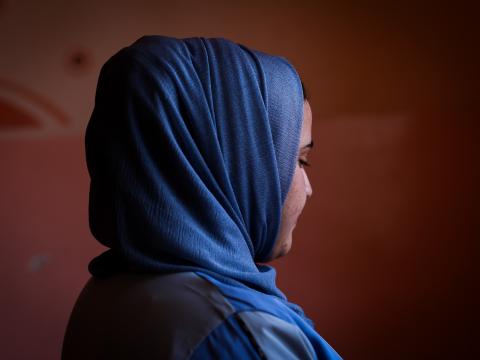On the Road of Empowerment

When Rima*, 17, failed the first year of secondary school, it was the third time she had failed to pass exams that would enable her to progress to the next academic level. She had already failed twice before when she was in the second and fifth grades of primary school. But with this third failure, she was determined to leave school for good.
There were many reasons for Rima’s difficulties in passing exams. During the conflict of 2014, Rima and her friends left school for three years until the conflict was over because the academic curriculum had been changed to promote violent and extremist ideologies. Rima said, “Those were very dark days. We saw things we had never seen before. It was a very tragic situation. There was no food or water. But it is over, thanks to God. I left school during the conflict. They changed the curriculum, so my parents didn’t allow me to go to school, and my friends also didn’t go. We missed three years of education.”
When the conflict was over, Rima and her classmates were accelerated into higher-level classes without proper education. Moreover, soon after, the COVID-19 pandemic happened, and Rima had to rely on online learning, from which she couldn’t grasp much of the content.
Just around those days when Rima was contemplating leaving school for good, Rima’s mother was approached by the World Vision Iraq team. The team told Rima’s mother about a project for adolescent girls, the Adolescent Toolkit Programme. This programme, implemented by World Vision Iraq with funding from Japan Platform in West Mosul, aims to help young girls like Rima become more empowered, gain a better sense of control over their lives, and have greater emotional self-awareness.
Rima eventually agreed to return to school and take part in the adolescent girls’ programme. It was then that everything changed for Rima. “I took the course for one month and a half. I regained all my energy as I was under a lot of psychological pressure. When I failed in the first year of primary school, I didn’t want to continue schooling. After the adolescent sessions, I felt that I shouldn’t give up and that I must improve myself. Thanks to God I benefited a lot from those sessions, and I learned how to interact and deal with my parents, how to solve problems, especially the early marriage issue. I learned not to stop in life and that there is hope. There is a long road, and we must pass it.”
Rima’s decision not to give up was an important step in her life, but beyond that, she is now an empowered young woman. She is fully aware of the transformation she went through due to these sessions. At home, Rima lives with her parents, five siblings, and her three married brothers’ families in one home. The home is small and overcrowded, and Rima struggles. Because of the crowdedness of her home, she can barely study during the day. Her best time to study is when everyone goes to sleep. She not only does homework but also helps her family with house chores.
In school, she noticed the change in herself, “I never participated actively in classes before, but after these sessions, I changed. My participation increased, and my teacher also noticed that. We must dare to talk.” Today, Rima is grateful that she continued schooling and didn’t give up. “I am most grateful for this life. I am grateful that I can study, despite all the difficulties I face at home. I organise my time. Through the adolescent sessions, I learned to organise my time,” said Rima.
Rima today recognises the unfortunate situation for many young girls in Iraq; she witnesses many young girls around her getting married at a young age due to traditional practices. But she rejects this idea. Rima said, “Currently the big issue in Iraq is tribal thinking. They urge girls to drop out of school to get married. Now girls get married at the age of twelve or thirteen. One of my relatives got married at the age of twelve. She was very young, and this is a mistake. It is wrong because the girl is too young, not mentally developed enough, and not physically developed enough. We must talk to parents with love and calmness to persuade them on this issue. Even if a man proposes to me and I don’t want to marry him, I must negotiate with my parents with calmness. After the sessions, I changed a lot, and there were things that I didn’t know about. I know everything now and the essentials of life that we must follow.”
Her message to other young girls: “Everyone must study. An educational certificate is like a weapon. If you are educated, people will respect you.” Rima’s happiest moment is when she gives her passing exam certificate to her parents.
World Vision Iraq, with funding from Japan Platform, started the Adolescent Toolkit program in 2022. Since then, we have been empowering 480 young girls like Rima to have a greater sense of responsibility over their lives, better time and emotional management, and an understanding of critical issues like child marriage and child labour.
*Name has been changed to protect identity.